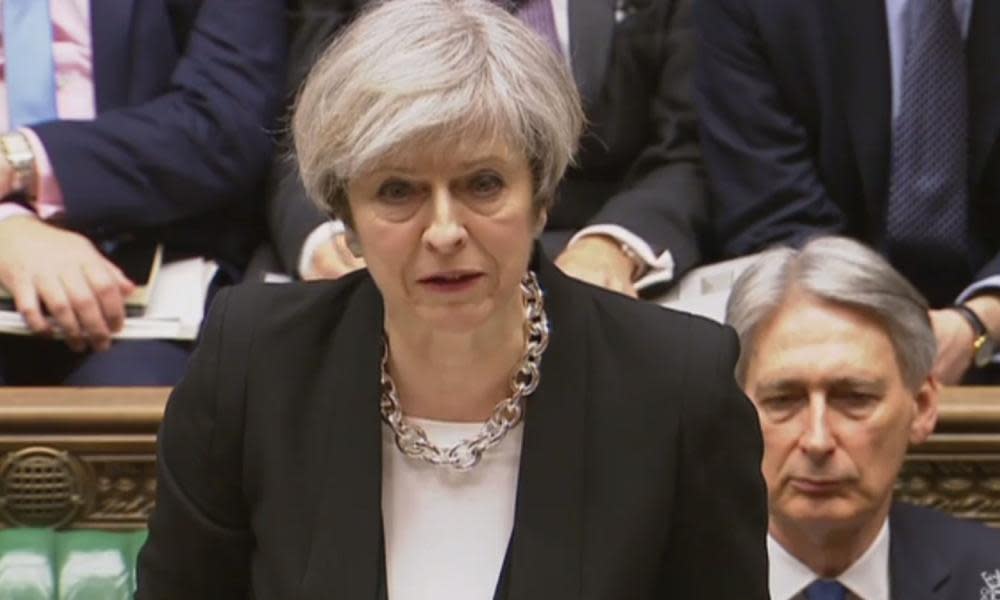Khalid Masood: questions over how much MI5 knew about attacker

When Theresa May mentioned MI5 in the Commons on Thursday, she was trying to be helpful, pre-empting criticism that the agency failed to prevent the London attack. As a tactic, it did not entirely work: Friday’s Daily Telegraph front page headline was “Killer escaped from MI5’s radar”.
After the London bombings in 2005 and the murder of Fusilier Lee Rigby in 2013, it was fair to question what the police and MI5 knew in advance and what, if anything, they could have done to stop it.
It was unusual for a prime minister, as May did in the Commons, to talk so openly and specifically about a spy agency, as she did on Thursday. Her statement – which would have been seen beforehand by MI5’s director Andrew Parker and based on information supplied by the agency – was designed to try to stop accusations of blame by putting out information early.
She disclosed that the attacker Khalid Masood was once investigated by MI5 in relation to concerns about violent extremism but that he was “a peripheral figure” and that the case had been historic. He had not been part of any current investigation.
Her words were well-intentioned but only served to raise questions, still unanswered, about how Masood was “peripheral” and what the incident was that brought him to the attention of the agency in the first place. A full explanation is promised eventually.
MI5 and the UK’s two other intelligence agencies – the surveillance body GCHQ and MI6, responsible for overseas spying – faced legitimate questions after the London bombings. Since there had been four attackers involved in the London bombings, there had been advance planning and chatter that might have been picked up. In the case of Rigby, one of the two attackers involved had been monitored by MI5.
But Masood appears never to have been monitored. He came to the attention of MI5 a number of years ago over a mystery single incident that it concluded did not justify monitoring. May’s description might have been better phrased as barely peripheral: he did not even make MI5’s secret list of 3,000 that it keeps tabs on.
If MI5 was not monitoring him, the agency would not have recorded the various key incidents in his life and the one that is of prime interest now: the moment he became radicalised. The agency is now in the process, along with the police, of piecing together his life and his associates.
In spite of arrests around the country, Masood is still regarded as being a lone actor and his attack not part of a co-ordinated and planned attack.
His radicalisation could have started years ago, from his time in prison, Saudi Arabia, or it could have happened more recently. Many young jihadis who headed off to fight in Syria or Iraq for Islamic State did so after watching Isis videos or online chats, the process of radicalisation taking just a few weeks – though Masood, at 52, is decades older than most of them and so not necessarily part of that social media generation.
Masood could also have been radicalised in Birmingham, with people from the city linked to more Islamic terror plots than anywhere else in Britain, bar London. Areas in and around Small Heath and Sparkbrook are most associated with violent extremism – although it is only a tiny fraction of the population which falls for the lure of terrorism.
One source with close knowledge of counter-terrorism efforts in Birmingham said Masood did not fit the typical patterns of a jihadi from the city, including the areas he chose to live: “It’s not the usual Birmingham. He’s not been born and bred in Birmingham, he’s not been living in the city associated with extremism, he’s not from a Pakistani background, which is the norm.
“He is a convert who appears to be living away from normal Muslim life [in the city].”
MI5 staff and the police, many of them working long hours since the London attack, were devastated by Masood’s actions. But if, as they say, they were not monitoring him, they will respond by asking how could they have picked up weeks, months or years ago something to suggest that he might have carried out a terrorist attack.

 Yahoo News
Yahoo News 
